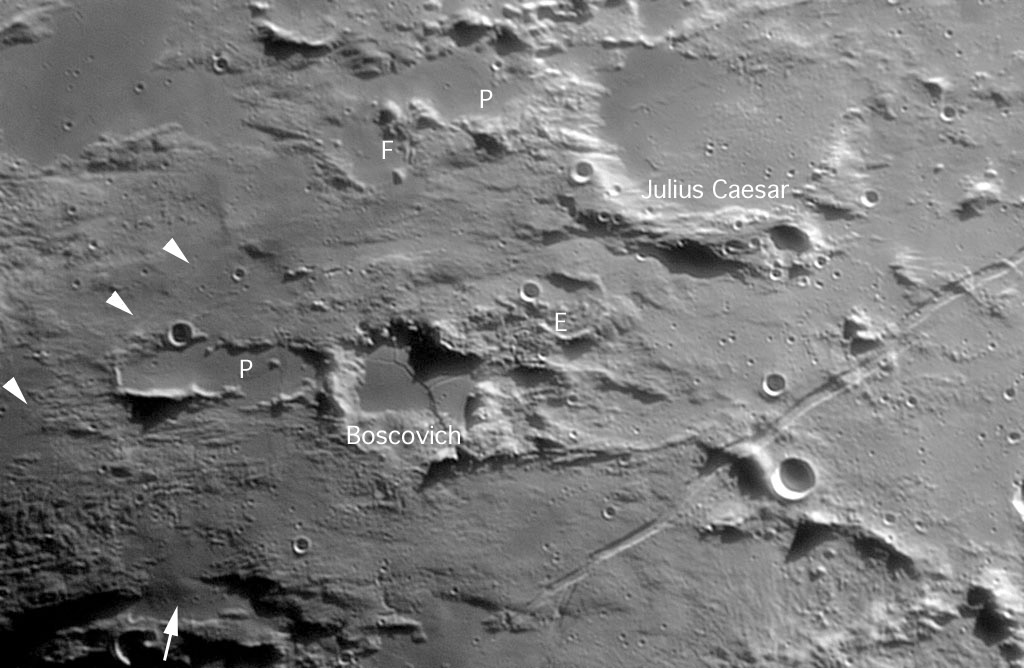Difference between revisions of "March 1, 2008"
| Line 1: | Line 1: | ||
__NOTOC__ | __NOTOC__ | ||
=Smoothered= | =Smoothered= | ||
| + | <!-- Start of content --> | ||
<!-- ws:start:WikiTextHeadingRule:0:<h1> --> | <!-- ws:start:WikiTextHeadingRule:0:<h1> --> | ||
<br /> | <br /> | ||
| Line 24: | Line 25: | ||
<p><b>Yesterday's LPOD:</b> [[February 29, 2008|A Forgotten Corner]] </p> | <p><b>Yesterday's LPOD:</b> [[February 29, 2008|A Forgotten Corner]] </p> | ||
<p><b>Tomorrow's LPOD:</b> [[March 2, 2008|7 + 1]] </p> | <p><b>Tomorrow's LPOD:</b> [[March 2, 2008|7 + 1]] </p> | ||
| + | <!-- End of content --> | ||
{{wiki/ArticleFooter}} | {{wiki/ArticleFooter}} | ||
Revision as of 20:11, 7 February 2015
Smoothered

image by Jérôme Grenier; north is to the upper left
Julius Caesar - the 90 km wide crater, not the Roman general and destroyer of a republic - is about 500 km from the Apennine Front, the rim of the Imbrium impact basin. The crater and the area surrounding it were blasted, scoured, pelted and pasted by debris falling from the sky and rushing across the surface. Caesar, its F and P, Boscovich and a few other features here are pre-Imbrium craters that survived, barely. Other than the much younger small impacts, most of the other crateriform structures - like Boscovich P and perhaps E - are probably Imbrium secondary craters. The line of multiple overlapping craters - Boscovich P - is characteristic of basin secondaries, as is its radial alignment with Imbrium. The dark mare lava in Boscovich, Caesar and a few other low spots was erupted much later. The slathering of the surface with the pasty ejecta mush created undulating terrain with small groves and hills. At Boscovich E it looks like course ejecta surged along the surface and spilled into and then out of the crater. Near the bottom left corner the arrow points to a small dome-like feature. This may be a volcanic dome fed by magma rising from depth, but it might also be some pre-existing hill plastered and smoothed by the ejecta flow. Finally note the delicate straight rille indicated bythe three arrowheads. At first I thought this was a seam boundary for a mosaic, but it changes its width and character along strike. And then I thought I've seen this before! It was discovered by K.C. Pau, and I thought there was an LPOD of it but I couldn't find it. I did find one of K.C. images that confirms it with no doubt. This is Pau's Rille.
Chuck Wood
Technical Details
13 February 2007. Orion Optics (UK) OMC 12" + barlow 2x + red filter + Dmk31 AF03.
Related Links
Rükl plate 34
Jérôme's website
COMMENTS
Yesterday's LPOD: A Forgotten Corner
Tomorrow's LPOD: 7 + 1
COMMENTS?
Register, Log in, and join in the comments.



